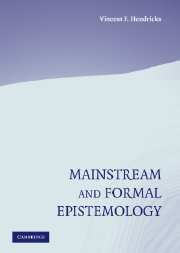7 - Computational Epistemology
Published online by Cambridge University Press: 07 December 2009
Summary
Apart from recent trends in logical epistemology, the epistemologies discussed in the preceding chapter largely neglect the connection between successful learning and knowledge. Computational epistemology is an approach embodying knowledge acquisition studies. It utilizes logical and computational techniques to investigate when guaranteed convergence to the truth about epistemic problems is feasible. Every epistemic problem determines a set of possible worlds over which the inquiring agent is to succeed witnessing a forcing relation.
FORCING ‘Logical reliability theory’ is a more accurate term, since the basic idea is to find methods that succeed in every possible world in a given range.
Kelly et al. (1997)Computational epistemology is not a traditional epistemological paradigm by any means – neither from the mainstream nor formal perspectives treated so far. It does not start off with global conceptual analyses of significant epistemological notions like knowledge, justification and infallibility. It does not follow logical epistemology in locally focusing on axiomatics, validity and strength of epistemic operators. Computational epistemology is not obligated to hold a particular view, or formulate its ‘characteristic’ definition, of what knowledge is. Given its foundation in computability theory and mathematical logic, computational epistemology is not actually about knowledge but about learning – but learning of course is knowledge acquisition.
- Type
- Chapter
- Information
- Mainstream and Formal Epistemology , pp. 115 - 129Publisher: Cambridge University PressPrint publication year: 2005



